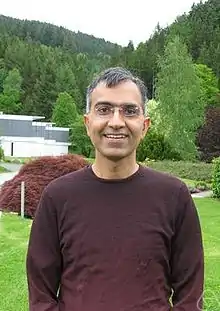Sanjeev Arora
Sanjeev Arora (born January 1968) is an Indian American theoretical computer scientist.
Sanjeev Arora | |
|---|---|
 Arora at Oberwolfach, 2010 | |
| Born | January 1968 (age 55) |
| Citizenship | United States[1] |
| Known for | Probabilistically checkable proofs PCP theorem |
| Scientific career | |
| Fields | Theoretical computer science |
| Institutions | Princeton University |
| Thesis | (1994) |
| Doctoral advisor | Umesh Vazirani |
Life
He was a visiting scholar at the Institute for Advanced Study in 2002–03.[2]
In 2008 he was inducted as a Fellow of the Association for Computing Machinery.[3] In 2011 he was awarded the ACM Infosys Foundation Award (now renamed ACM Prize in Computing), given to mid-career researchers in Computer Science. Arora has been awarded the Fulkerson Prize for 2012 for his work on improving the approximation ratio for graph separators and related problems (jointly with Satish Rao and Umesh Vazirani). In 2012 he became a Simons Investigator.[4] Arora was elected in 2015 to the American Academy of Arts and Sciences and in 2018 to the National Academy of Science[5]
He is a coauthor (with Boaz Barak) of the book Computational Complexity: A Modern Approach and is a founder, and on the Executive Board, of Princeton's Center for Computational Intractability.[6] He and his coauthors have argued that certain financial products are associated with computational asymmetry, which under certain conditions may lead to market instability.[7]
Books
References
- "Sanjeev Arora". www.cs.princeton.edu.
- Institute for Advanced Study: A Community of Scholars Archived 2013-01-06 at the Wayback Machine
- ACM: Fellows Award / Sanjeev Arora Archived 2011-08-23 at the Wayback Machine
- Simons Investigators Awardees, The Simons Foundation
- "Professor Sanjeev Arora Elected to the National Academy of Sciences - Computer Science Department at Princeton University". www.cs.princeton.edu.
- "Video Archive". intractability.princeton.edu.
- Arora, S, Barak, B, Brunnemeier, M 2011 "Computational Complexity and Information Asymmetry in Financial Products" Communications of the ACM, Issue 5 see FAQ Archived 2012-12-02 at the Wayback Machine